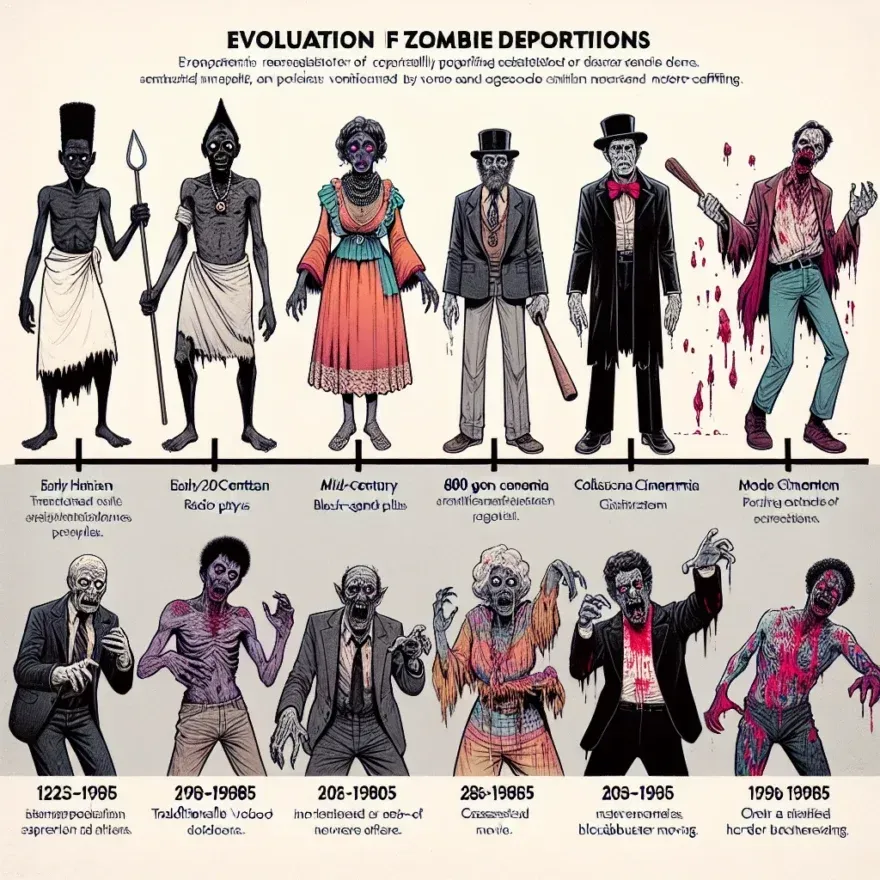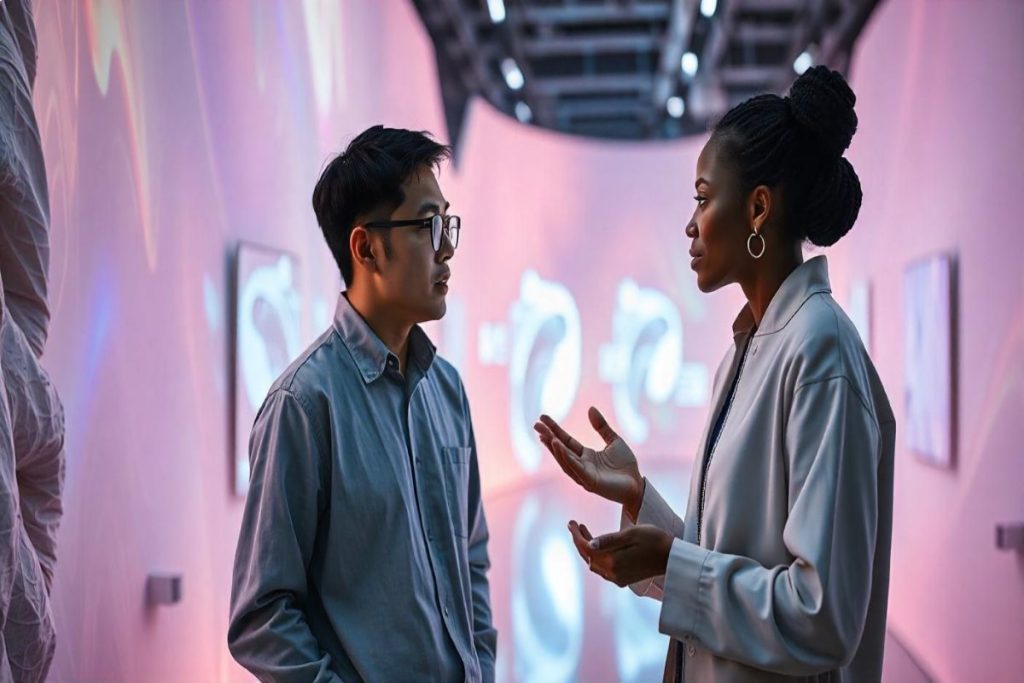Zombie culture has become a fascinating lens through which we analyze our contemporary fears and societal anxieties. As we delve into the world of undead portrayals in media—from trending 2025 zombie movies to iconic series like “The Walking Dead”—we uncover rich symbolism that resonates with our post-apocalyptic narratives and the anxieties surrounding our current global landscape. The rise of zombie metaphors highlights the chaos inherent in our existence, illustrating our frustrations and existential dread in a world that often feels out of control. From mindless hordes to deeply introspective storylines, the evolution of zombie narratives prompts a discussion on human behavior and morality, inviting us to reflect on what it means to be alive. Embracing these cultural phenomena not only entertains but also offers profound insights into the complexities of modern life.
The fascination with the undead has given rise to a vivid subculture that permeates various aspects of entertainment and art. Within this realm, we encounter a multitude of interpretations of zombies—ranging from horror icons to symbols of societal collapse. Departing from traditional horror tropes, this genre now captures those experiences that reflect our vulnerabilities in an increasingly chaotic world. As narratives evolve, we see stories foster new understandings of fear, loss, and resilience, embodying our struggles to navigate both personal and collective crises. In essence, the fascination with the living dead extends beyond simple thrill; it embodies a profound exploration of human nature and the social conditions shaping our realities.
The Evolution of Zombie Culture in Film and Television
Zombie culture has undergone a significant transformation over the decades, evolving from the classic horror tropes of the 1960s to the complex narratives we see today. In 2025, films like “28 Years Later” and critically acclaimed series such as “The Walking Dead” continue to shape the genre. These entries not only focus on the visceral horror of the undead but also venture into deeper societal issues, such as the breakdown of social structures and post-apocalyptic survival. Zombies, once mere mindless predators, have emerged as potent symbols, representing collective fears about pandemics, societal collapse, and the loss of humanity itself.
As audiences become more discerning, the portrayal of zombies has shifted to reflect contemporary anxieties. The symbolism of zombies resonates with themes of globalization and political turmoil, making them relevant to current societal fears. New formats and storytelling techniques, such as integrating dark humor and moral dilemmas—evident in productions like “Duhpocalypse”—showcase a multifaceted approach to the genre. The ongoing fascination with zombie narratives brings forth questions about our humanity and survival instincts, allowing viewers to confront their fears in an increasingly chaotic world.
Symbolism of Zombies in Contemporary Society
Zombies have become a significant metaphor for a myriad of societal issues in contemporary culture. They serve as embodiments of fear, ignorance, and the consequences of blind conformity, aptly reflecting the complexities of modern life. This is evident in works like “The Last of Us,” where zombies personify the monsters created by human choices and societal failures, making them more than just flesh-eating ghouls. The symbolism of zombies often acts as a critique of consumer culture, where individuals are likened to mindless beings, absorbing content and endlessly scrolling through a barrage of information without true engagement.
Additionally, the way zombies traverse themes of grief and loss in narratives addresses our struggles with mortality and memory. With the advent of grief technologies and AI implementations offering “digital afterlives,” the notion of clinging to the past resurfaces, with zombies mirroring this haunting presence. The compelling relationships between the living and the undead compel audiences to reflect on their own connections to loss and remembrance, reinforcing the importance of confronting negative feelings rather than avoiding them. Thus, zombies become potent symbols that challenge our understanding of existence and place in the world.
The Role of Zombie Metaphors in Modern Storytelling
Zombie metaphors have become integral to modern storytelling, allowing creators to weave complex narratives that resonate with audiences on multiple levels. They are often utilized to explore deeper themes such as humanity’s struggle against external threats and internal conflicts. In today’s zombie narratives, characters are frequently portrayed grappling with moral dilemmas, showcasing their resilience or, conversely, their decline into nihilism. This narrative structure not only heightens the tension but also prompts viewers to introspect on their ethical beliefs amidst chaos, reflecting a broader commentary on societal values.
Furthermore, the integration of humor and irony in narratives featuring zombies presents a juxtaposition that captivates audiences. Productions like “Zombie Repellant” exemplify how humor can deflate the horror often associated with zombies, transforming them into tools for social commentary. By blending genres, creators are able to not only entertain but also provoke thought on contemporary issues ranging from political apathy to mental health. Thus, the clever use of zombie metaphors enables storytellers to craft layered narratives that remain impactful and relevant in an ever-evolving cultural landscape.
Post-Apocalyptic Narratives and Societal Reflection
The post-apocalyptic narrative framework is one of the mainstays of zombie culture, providing a backdrop for exploring human behaviors under extreme conditions. In a landscape ravaged by the undead, storylines often reveal a stark commentary on contemporary society, exposing the fragility of civilization when faced with collapse. For instance, the militarization of society in zombie films can be seen as a reflection of real-world tensions, where fear breeds authoritarian responses. Within these narratives, characters’ transformations often mirror societal reactions to crises, illuminating the instinctual drive for survival at all costs.
Moreover, through these post-apocalyptic lenses, creators can examine themes of community, trust, and betrayal—highlighting the essential human connections that paradoxically emerge in times of despair. The interactions between survivors often prompt poignant questions about morality, loyalty, and sacrifice, inviting audiences to reflect on their values in the face of overwhelming odds. This exploration is not merely about survival; it interrogates the human experience and our capacity for connection, resilience, and redemption, establishing a profound relationship between zombie narratives and societal reflection.
The Impact of Zombie Narratives on Pop Culture
Zombie narratives have had a profound impact on popular culture, influencing a wide array of media, from film and television to literature and video games. This genre’s appeal lies in its ability to tap into universal fears and societal critiques, enabling creators to engage audiences through thrilling yet contemplative storytelling. With mainstream hits such as “The Walking Dead” and films like “28 Years Later,” zombies have captured the imagination of millions, leading to a resurgence of interest in both horror and speculative fiction.
The cross-pollination of zombie culture with various artistic expressions has also led to the emergence of unique subgenres, such as romantic comedies like “Warm Bodies” and thought-provoking dramas that push the boundaries of traditional horror. The integration of zombies into diverse narratives allows for exploration of themes such as love amid disaster, the fragility of hope, and the search for identity in a world that feels irrevocably changed. Consequently, the enduring popularity of zombies in pop culture shapes not only entertainment but also the broader discourse surrounding human fears and societal issues.
Zombies and the Monotony of Modern Life
The connection between zombies and the monotony of modern life is a poignant theme that has emerged in recent zombie narratives. In their relentless pursuit of flesh, zombies symbolize the repetitive grind of everyday existence, resonating with a generation often overwhelmed by the humdrum of daily tasks and technological consumption. As Chuck Klosterman famously suggested, the act of dispatching zombies mirrors the exhaustion of dealing with modern life’s trivialities—like the never-ending cycle of emails and notifications—a repetitiveness that can feel just as mind-numbing as battling the undead.
This aspect of zombie culture highlights a broader commentary on the human experience in the digital age. As the lines blur between engagement and distraction, the slow, shuffling movement of zombies parallels the often stagnant experience of scrolling through social media feeds. Ultimately, through the lens of zombie narratives, audiences confront the realization that while they can escape the lurking zombies of their screens, they cannot evade the deeper existential questions of life, purpose, and the pursuit of authentic connections.
Zombies as a Reflection of Societal Anxieties
Zombies serve as a compelling reflection of societal anxieties, capturing the fears and uncertainties that plague contemporary life. The imagery of hordes of mindless creatures reflects collective concerns about issues such as disease outbreaks, environmental disasters, and political unrest. This connection is especially relevant in the wake of the COVID-19 pandemic, where the symbolism of zombies has become intertwined with our personal and societal experiences. Films and series released in the wake of social crises often utilize zombie narratives to externalize these fears, transforming panic into a form of entertainment that ultimately allows for catharsis.
Moreover, the portrayal of zombies often allows us to confront the darker aspects of human nature, including violence, survival instincts, and a desire for power. By presenting characters in extreme situations, creators invite audiences to explore moral complexities and the psychological depth of fear. The recurring themes of humanity’s fragility and struggles for dominance in post-apocalyptic settings serve as a powerful mirror to real-world situations, encouraging a deeper understanding of how societal pressures can shape human behavior. Through this lens, zombies are not just horrors to be vanquished; they embody the very anxieties that surround our existence.
Zombies and the Future of Media Consumption
As the landscape of media consumption evolves, the presence of zombies persists as a significant cultural touchstone, reflecting shifts in audience behavior and preferences. Today, zombies embody the masses’ mindless scrolling habits, acting as a metaphor for passive consumption in an age of information overload. The rampant production of zombie-themed content speaks to a broader cultural obsession with the undead that not only entertains but drives conversations about trends in media consumption, especially among younger audiences who engage through streaming platforms and social media.
Furthermore, as the lines between reality and the fantastical blur in a digital-first world, the portrayal of zombies becomes increasingly relevant. Audiences are drawn to content that resonates with their experiences and anxieties, allowing for a relationship with these narratives that feels both personal and urgent. In this context, zombies remind us of the potential pitfalls of disconnection from reality and the dangers of an overly mediated existence. By engaging with zombie narratives, viewers may find the opportunity to reflect on their digital interactions, ultimately questioning what it means to be truly alive amidst the cacophony of the living dead.
Critique of Cultural Memory: Zombies in the Digital Age
In the digital age, zombies have emerged as a powerful critique of cultural memory and our relationship with the past. The proliferation of reboots, sequels, and digital reproductions casts zombies as symbols of nostalgia and the fear of obsolescence. As we embrace technology to preserve memories, the undead serve as a reminder of what it means to let go, calling into question the value we place on retaining every fragment of our past. The juxtaposition of life and digital preservation raises profound existential questions about how we navigate memory and loss in an ever-connected world.
Zombies challenge the notion of authenticity in our experiences, illustrating the dangers of clinging to shoddy replicas of what once was. These narratives ask audiences to reflect on the consequences of living in a state of constant preservation, where the lines between the genuine and the counterfeit become blurred. This critique is further emphasized in contemporary media, where holograms and AI representations of the deceased illustrate our longing for connection, yet may ultimately hinder our ability to confront grief and loss. Thus, zombies become agents of a nuanced critique of contemporary cultural practices surrounding memory and mortality.
Embracing Zombification: The Loss of Identity
Zombification in narratives often embodies a loss of identity, with the transformation into a mindless creature reflecting society’s struggle with individuality in times of collective crisis. Characters who succumb to the undead plague frequently symbolize the breakdown of self—how overwhelming societal pressures can erode one’s essence. This theme resonates particularly in an age of globalization and mass media, where the distinction between self and other blurs, highlighting the human fear of losing individuality in an interconnected world.
Moreover, characters who embrace their zombification often find a paradoxical sense of peace, relinquishing the burdens of moral choice and societal expectations. This notion points to a deeper cultural critique, as individuals faced with crises often succumb to the allure of apathy and disengagement. The slow march of zombies through narratives acts as a metaphor for the existential crises many face, provoking introspection about the consequences of surrendering one’s identity. Through this exploration, zombie narratives reveal societal fears about the erosion of self in the face of overwhelming forces, urging us to confront our individual and collective responsibilities.
Frequently Asked Questions
What are the main themes in zombie culture as seen in 2025 zombie movies?
The 2025 zombie movies highlight themes of societal collapse, identity loss, and the human condition’s darker aspects. Films like “28 Years Later” and series such as “The Walking Dead” explore post-apocalyptic narratives where survivors confront moral dilemmas, reflecting modern anxieties such as disease, invasion, and the fear of losing one’s humanity to the mindless horde.
How do zombie metaphors reflect societal fears?
Zombie metaphors serve as powerful symbols of societal fears, from post-pandemic anxieties to concerns over immigration and cultural erosion. By embodying unchecked consumption and mindless conformity, zombies in popular culture critically reflect a society grappling with the implications of globalization and the loss of individual identity.
What role does symbolism of zombies play in ‘The Walking Dead’?
In ‘The Walking Dead’, the symbolism of zombies transcends mere horror, as they represent the characters’ struggles with morality, survival, and the fragility of civilization. The relentless advance of the undead parallels the characters’ internal battles, showcasing what it means to remain human amid a crumbling social order.
Why are post-apocalyptic narratives featuring zombies so popular?
Post-apocalyptic narratives featuring zombies resonate with audiences due to their exploration of human resilience, societal breakdown, and the moral ambiguities of survival. They tap into collective fears about societal decay while offering a cathartic reflection on the human condition in times of crisis, making them particularly relevant in today’s world.
How do zombies symbolize loss and grief in contemporary media?
Zombies symbolize loss and grief in contemporary media by personifying the fear of obsolescence and the difficulty of letting go. They serve as reminders of what humanity has lost—both in terms of relationships and cultural heritage—through narratives that evoke deep-rooted anxieties about mortality and the aftermath of trauma.
What insights do 2025’s zombie films provide on current cultural issues?
2025’s zombie films offer critical insights into current cultural issues such as political polarization, economic despair, and the emotional toll of technological advancements. By depicting characters grappling with moral choices in a zombie-infested landscape, these narratives reflect the pervasive sense of fear and uncertainty in contemporary society.
How do zombies reflect the monotony of modern life, as suggested in zombie culture discourse?
Zombies reflect the monotony of modern life by embodying the repetitive and draining tasks that echo daily existence, such as the endless cycle of killing and survival seen in zombie narratives. This connection emphasizes the fatigue stemming from modern obligations, such as work and digital distractions, making zombies a metaphor for the exhaustion of the human experience.
What can we learn about our fears regarding death and immortality from zombie culture?
Zombie culture prompts reflection on our fears surrounding death and immortality, highlighting a societal obsession with extending life while simultaneously grappling with loss. Through stories of the undead, we confront uncomfortable truths about mortality and the consequences of resisting the natural cycle of life, creating a dialogue around acceptance and what it means to truly live.
| Key Points |
|---|
| Zombies symbolize our societal issues including fears about globalization, populism, disease, and loss. |
| The recent surge in zombie-themed pop culture, particularly films and series, indicates a renewal of societal obsession with the undead. |
| Zombie narratives often explore existential themes, such as the collapse of civilization and the moral dilemmas of survival. |
| Zombie culture can represent personal and collective grief, acting as a metaphor for avoiding real emotions and loss. |
| Modern technology complicates our relationship with loss and memory, reflecting the themes prevalent in contemporary zombie stories. |
Summary
Zombie culture is not just about undead monsters; it delves into profound themes that reflect our contemporary society’s fears and anxieties. From the resurgence of zombie films and series to the exploration of existential dilemmas within narratives, this phenomenon serves as a mirror to the chaos and challenges we face today. Zombies encapsulate our struggles with globalization, loss, and the mundane routine of modern life, inviting us to confront uncomfortable truths about ourselves and the world around us. As we continue to engage with this culture, we must recognize the deeper messages embedded within these eerie tales, allowing them to inform our understanding of our own humanity.



